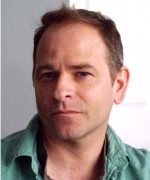Column Name
Title
Jonathan Dawe was born in Boston and grew up in Katonah, N.Y. He received a B.M. from Oberlin College and an M.M. and D.M.A. from Juilliard. A member of the faculty since 1995, Dawe is a composer whose music often features a mix of early music and compositional workings based upon fractal geometry. His current projects include a chamber opera, Orlando Furioso, for the Second Instrumental Unit and the dance/theater group Company XIV, as well as a Concerto for Mandolin and Santur for the Cygnus Ensemble, for the concert event “Venice and the Islamic World.” Both performances will take place in the spring of 2010.
Body
When did you first know you wanted to be a musician and how did you come to know it?
For a seventh-grade class project we had to analyze a piece; I chose Bach’s Second “Brandenburg” Concerto. The way that work revealed itself, the drama of that form and the manner in which its structure and surface material worked as one … I have been trying to replicate such things ever since.
Who was the teacher or mentor who most inspired you when you were growing up and what did you learn from that person?
Although there have been many, I would have to cite three: Jay Frey of the Harvey School, Richard Hoffmann at Oberlin, and Juilliard’s Milton Babbitt. They each embodied such enthusiasm and taught me not only how to think about music but also to conceptualize within it. Also, they each, in their singular way, demonstrated how instrumental humor is in life.
What was the first recording that you remember hearing? What was its significance to you?
The opening of Beethoven’s Ninth Symphony. It’s significance? It’s the opening of Beethoven’s Ninth Symphony.
What’s the most embarrassing moment you’ve had as a performer or in your career?
Egad, why would I want to relive that … and have it in print? Well, I could say it involved the “Rococo” Variations, a page-turn debacle, in the year 1979.
If you could have your students visit any place in the world, where would it be, and why?
Well, I suspect they have traveled far more than I have, but I would mention Istanbul. Why? Because it used to be Constantinople and was for centuries the center of the world (as many would claim it still is).
What would people be surprised to know about you?
Well, perhaps that, beyond composition, my ardor lies in early music, and years ago I was a krumhorn player at Oberlin. Of further intrigue, in the more distant past, I used to be a good hockey player and an even better lacrosse player, and in rare unexplainable moments, I miss those art forms.
If your students could only remember one thing from your teaching, what would you want it to be?
So much of what I’ve learned over the years, I’ve learned on my own. However, I suspect I never would have been able to acquire this knowledge if I did not have the dynamic teachers in my past instilling in me the means and excitement to do this. In the end, I am not as concerned about what students learn as much as empowering their passion to discover endlessly.
What book are you reading right now and what can you tell us about it?
I am currently reading, almost simultaneously, Gerusalemme liberata by Torquato Tasso and The Book of Contemplation by Usama ibn Munqidh, two different perspectives of the First Crusade, although the sentiments and standpoints shared between these two narratives are striking.
What is your favorite thing about New York City?
Its depth.
If you weren’t in the career you are in, what would you be doing?
1) Visual artist. 2) Archaeologist … really.





